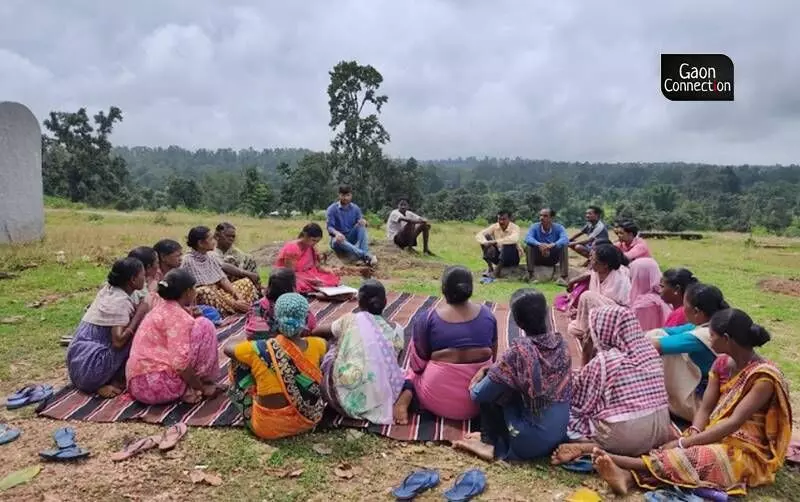Frontline workers win the COVID-19 vaccine battle despite insurmountable odds in remote areas of Jharkhand
Remote villages, lack of transportation and vaccine hesitancy were no deterrent to the frontline workers to achieve almost near-total COVID-19 vaccination of the inhabitants of 82 villages in 21 panchayats in Ranchi district of Jharkhand.
 Manoj Choudhary 19 March 2022 6:48 AM GMT
Manoj Choudhary 19 March 2022 6:48 AM GMT

Ranchi, Jharkhand
Frontline workers gathered at the Community Health Centre at Sikidri in Hesatu panchayat of Ranchi district in Jharkhand to celebrate the fact that 82 villages in 21 panchayats, as well as some areas under the South Chotanagpur division, had achieved 98 per cent of COVID-19 inoculation. They were being felicitated by the administration for having achieved this target in the hard to reach areas.
Uttam Prasad, block development officer (BDO), and Amrendra Prasad, the medical officer felicitated health personnel for controlling the pandemic through vaccination drives. These front line workers have crossed forests, hills, rivers and pagdandi (muddy paths), to vaccinate people living in remote tribal regions of Jharkhand.
"We used to move from village to village, convincing people and giving them examples of people who were vaccinated and were well and alive," Sevika Renu Singh, from Hesatu, told Gaon Connection. According to her, they often had to leave a village and move on because of strident objections. But they always returned to the village to complete their work. Often, they went there with vaccinated villagers to convince others.
Frontline workers, panchayat health facilitators, community health officers and other public representatives recalled their challenges in administering the COVID 19 vaccines in tribal dominated areas where there was fear and resistance to the inoculations. They had to combat fears, rumours and superstitions that made inhabitants reluctant to step forward and get vaccinated.
Also Read: Healthcare at the doorstep of rural, tribal communities in Jharkhand through the e-Sanjeevani
Despite the challenges, Transform Rural India Foundation (TRIF), a non profit, supported the government and mobilised people for ensuring 97 per cent vaccination in five districts of South Chotanagpur division, covering a population of about 320,000.
"TRIF personnel and frontline health workers visited villages again and again till all those over 18 years of age were vaccinated. They did not hesitate to visit the Naxal affected areas either," Sharat Pandey, state programme officer of TRIF, told Gaon Connection.
"They achieved ninety five per cent vaccination of the first dose and eighty per cent of the second one in over 700 hard to reach areas in South Chotanagpur division," the state programme officer added. These were areas that could turn violent and where transportation was a big challenge. "The TRIF workers met with influential people in the villages as well as public representatives to ensure successful vaccination," Pandey explained.
By February 25, 2022, according to Md Haroon, block coordinator of TRIF, 79,985 persons had received the first dose of the vaccination and 56,428 the second dose in Angara block. TRIF conducted 3,352 sessions for the vaccination target population of 81,629 in Angara, he added.
Fighting myths and rumours
Banit Bedia was one of those who vehemently refused to be vaccinated. From Melghosa village, he resisted for a long time. But, the frontline workers convinced him of the benefits of getting vaccinated and the harm that could befall him if he did not get the jab, he capitulated. But now, Bedia is an active campaigner for the vaccine and persuades friends and villagers to get inoculated.
Banit told Gaon Connection that he was moved by the dedication and spirit of service of the frontline workers.
"We found that the younger people aged between fifteen to eighteen years were more forthcoming for vaccinations," Sikandar Mahato, a panchayat health facilitator from Hesatu, told Gaon Connection. It was particularly difficult to convince the males, he added.
Also Read: Fish farming comes to the rescue of UP farmers who suffer regular crop losses
Recalling one of the awareness drive camps at Kuchchu panchayat, TRIF's block coordinator Haroon said, "Vendors in the local market closed their shops and left the area once we set up the vaccination camp there." But the TRIF workers, along with the government officials, wore down the fears and reluctance of the inhabitants by seeking active support of village level influencers and self-help groups.
"These groups played a crucial role in making the vaccination drive successful," Haroon said.
Some of the frontline workers had to convince their own family members to get vaccinated for their own good and for the welfare of humankind. There were rumours about how vaccinations would lead to death, leave them unfit to work, or render them impotent.
But for some health workers, their families were their biggest source of strength.
"Whenever I feared getting infected myself as my job required me to be in regular contact with a lot of people, my family urged me to do my job. They believed that my hard work would ensure protection to each and every member of the community," Rajni Kumari, panchayat health facilitator in Hesatu, told Gaon Connection.
Initially, the health workers would find barely 10 people a day to vaccinate. But at a recent camp held at Sikidri village, 450 people turned up for vaccination and front line workers had to call the police to maintain law and order!
Rajesh Pahan, mukhia of Hesatu panchayat told Gaon Connection that he used social media to fight rumours and to convince villagers to get vaccinated in the larger interest of their family and future of the country.
At a few camps, villagers were proactive enough and stepped forward to help the frontline workers and often provide them with breakfast or lunch.
Front line workers in Hesatu panchayat were particularly happy that in the five villages under their watch, only 20 to 25 positive cases were detected and there were no deaths due to COVID-19.
This story has been published as part of a collaboration with the Transforming Rural India Foundation.
#Jharkhand Covid-19 #vaccination
More Stories




